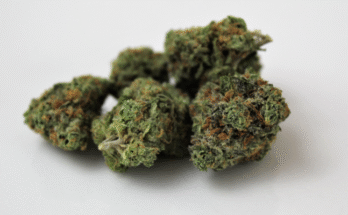The Food Standards Agency in the UK has taken a significant step in revising their recommendations for the safe daily dose of cannabidiol, or CBD.
This cannabis extract, found in a myriad of high street products, has become wildly popular over the last five years.
However, the FSA has now expressed concerns about its potential long-term health risks, particularly pertaining to liver problems.
Previously, the FSA’s recommended safe daily dose of CBD stood at a relatively high 70 milligrams.
However, this number has now been drastically reduced to a mere 10 milligrams.
So, what’s the deal? Is there reason to think that CBD can cause damage to the liver? Should we really be limiting ourselves to 10mg of CBD per day? Or is the FSA overstating risks for some other reason?
Why the change?
The Food Standards Agency’s decision seems to be primarily rooted in caution.
They have emphasised that there is no “acute safety risk” associated with consuming more than 10 milligrams of CBD daily. Their concern lies with the potential long-term consequences of exceeding this threshold.

To come to this, two independent committees reviewed the scientific evidence on CBD, including data provided by CBD product manufacturers.
Professor Robin May, the chief scientific advisor at the FSA, says they found that “the more CBD you consume over your lifetime, the more likely you are to develop long-term adverse effects, like liver damage or thyroid issues.
“The level of risk is related to how much you take, in the same way it is with some other potentially harmful products such as alcoholic drinks.”
Alcohol vs CBD
However, comparing CBD to alcohol is very misleading. CBD has been shown in numerous studies to be non-toxic, and the only evidence showing potential liver damage after long term use are based on studies in rodents, not humans.
Alcohol is responsible for more than 20,000 deaths each year in the UK. As well as harming the liver, alcohol can also lead to brain damage, cardiovascular issues and addiction.
Meanwhile, CBD is generally considered safe and non-intoxicating. It does not produce the euphoric “high” associated with THC, is not considered addictive, and there is little evidence to suggest that it leads to dependency or withdrawal symptoms.
CBD has also shown to have powerful anti-inflammatory, anti-anxiety, and neuroprotective properties. CBD is also used to treat seizure disorders, sleep disorders, addiction and neuropathic pain.

What’s the real risk?
Many research studies have tried to figure out how much CBD is safe for people. They were worried that taking too much CBD might harm the liver.
One review looked at 18 different studies where 1,127 people took part. The researchers found that when healthy volunteers used CBD, they didn’t see any serious side effects.
The Australian Therapeutic Goods Administration (TGA) used this information to recommend a maximum daily CBD dose of 150mg.
However, while CBD is recognised for its potential therapeutic properties and is readily available in various forms, including oils, drops, capsules, sweets, drinks, and more, not everyone should be reaching for CBD products without restraint.
Certain groups, such as pregnant women and individuals taking specific medications, should probably limit their CBD consumption as there has been little scientific enquiry on the effects of CBD on these demographics.
As with any health supplement, individuals should consider their unique circumstances before incorporating CBD into their daily routines.

Industry effects
While the FSA’s recommendation is only guidance, the CBD industry as a whole is still impacted. Customers maybe needlessly spooked, while companies will be incentivise to adjust their dosage instructions to align with the FSA’s new recommendation.
Despite the challenges, the UK CBD industry is used to over regulation and needless bureaucracy and has continued to grow.
In response to the FSA’s new recommendations, the Association for the Cannabinoid Industry offered their perspective.
They emphasised that the FSA still regards CBD as safe and the guidance primarily pertains to the consumption of daily high doses of CBD over an extended period.
Furthermore, it’s essential to clarify that these recommendations are advisory, and regulators are not mandating the removal of products from store shelves.
Food Standards Scotland has echoed this advice, aligning itself with the FSA’s position.
Moving forward
Emily Miles, the CEO of the FSA, acknowledges the impact this shift in advice will have on products currently available in the market that exceed 10mg of CBD per serving.
She ensures that the FSA will collaborate with the industry to mitigate any potential risks.
As this new guidance is rolled out, the FSA has compiled a list of CBD food products under review.
While inclusion on this list does not guarantee authorisation for sale, it indicates products that are in the process of being fully assessed for safety. It also suggests that any unlisted products should not be sold in England and Wales, as per FSA recommendations.

Conclusion
The Food Standards Agency (FSA) in the UK has revised its recommendations for the daily dose of CBD, lowering it from 70 milligrams to 10 milligrams due to concerns about potential long-term health risks, especially related to liver problems.
This change is rooted in caution, as there is no immediate safety risk associated with consuming more than 10 milligrams of CBD daily.
While specific groups like pregnant women and those on certain medications should exercise caution over CBD, there is very little evidence that CBD can cause harm even over long term use.
Although the guidance is advisory, not regulatory, and products are not being mandated for removal from store shelves, this move by the FSA will harm the UK’s CBD industry, which has already had to contend with needless bureaucracy and over regulation.
It makes me think, why are the authorities so determined to stifle the CBD industry in the UK? – (adjusts tin foil hat.)
🌿 Sign up below for UK Cannabis Weekly – where over 15K canna-curious readers enjoy a 5-minute weekly dose of the latest UK weed news, reviews and insider tips!




